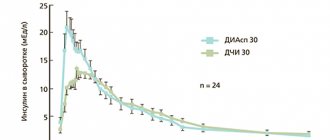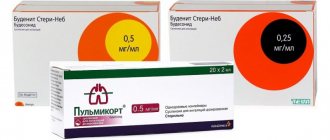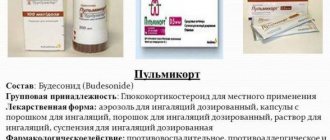Buy Clenil UDV suspension for inhalation ampoules 800mcg/2ml No. 20 in pharmacies
Clenil UDV Buy Clenil UDV in pharmacies Clenil UDV in the drug directory DOSAGE FORMS suspension for inhalation 400 µg/ml
MANUFACTURERS Chiesi Pharmaceuticals S.p.A. (Italy)
GROUP Drugs with glucocorticosteroid activity
COMPOSITION Active ingredient: Beclomethasone.
INTERNATIONAL NON-PROPENTED NAME Beclomethasone
SYNONYMS Aldecin, Beklazon Eco, Beklazon Eco Easy Breathing, Beklat, Beklodzhet 250, Beklokort, Beklomet, Beklometasone Orion Pharma, Beklospir, Bekloforte, Bekotid, Klenil, Nasobek, Rinoklenil
PHARMACOLOGICAL ACTION Anti-inflammatory, anti-allergic, anti-edematous, anti-asthmatic. It has pronounced glucocorticoid and weak mineralocorticoid activity. When administered endobronchially, it inhibits the migration and activation of cells involved in the allergic inflammatory process, compacts the basement membrane of the epithelium, reduces the secretion of mucus by goblet cells, reduces the number of mast cells in the bronchial mucosa, relaxes the smooth muscles of the bronchi, and restores its sensitivity to adrenomimetics. Systemic absorption is possible with any form of administration (endobronchial, intranasal, oral inhalation). The therapeutic effect develops within 4-5 days from the start of treatment and reaches a maximum within several weeks. Excreted in feces and urine.
INDICATIONS FOR USE Bronchial asthma, chronic obstructive pulmonary diseases, vasomotor rhinitis, recurrent nasal polyposis, allergic rhinitis (seasonal and permanent), juvenile rheumatoid arthritis, inflammatory bowel diseases, dysphonia in systemic lupus erythematosus, persistent inflammation of the middle ear in children, bronchopulmonary dysplasia of newborns .
CONTRAINDICATIONS Hypersensitivity, first trimester of pregnancy, breastfeeding. Restrictions on use. Systemic infections, tuberculosis, herpetic eye lesions, II and III trimester of pregnancy.
SIDE EFFECTS Hoarseness, sore throat, bronchospastic reactions, sneezing attacks, rhinorrhea, feeling of dryness and irritation in the nose, nosebleeds, atrophic rhinitis, ulceration of the nasal mucosa, perforation of the nasal septum, headaches, dizziness, cataracts, increased intraocular pressure , leukocytosis (including neutrophilic), lymphopenia, eosinopenia, manifestations of hypercortisolism, incl. Cushing's syndrome (when using high doses), oropharyngeal candidiasis and aspergillosis, nasal candidiasis, eosinophilic pneumonia, urticaria, angioedema.
INTERACTION Increases the effect of beta-agonists, which enhance the anti-inflammatory properties of beclomethasone (increase its penetration into the distal bronchi).
METHOD OF APPLICATION AND DOSAGE For inhalation administration, the average dose for adults is 400 mcg/day, frequency of use is 2-4 times a day. If necessary, the dose can be increased to 1 g/day. For children, a single dose is 50-100 mcg/day, frequency of use is 2-4 times a day. When administered intranasally, the dose is 400 mcg/day, the frequency of use is 1-4 times/day. For external and local use, the dose depends on the indications and the dosage form of the drug used.
OVERDOSE Symptoms: hypothalamic-pituitary-adrenal insufficiency. A temporary transfer to systemic glucocorticoids and ACTH are indicated.
SPECIAL INSTRUCTIONS Cannot be used to relieve an acute asthmatic attack. If an acute asthma attack develops in response to the use of beclomethasone, it should be discontinued immediately. If there are signs of hypothalamic-pituitary-adrenal insufficiency, inhalations should be continued, but be sure to monitor the level of basal cortisol in the blood plasma. The same monitoring is needed when using high doses of beclomethasone. The transfer of patients with bronchial asthma from systemic glucocorticoids to inhaled forms of beclomethasone dipropionate must be carried out gradually: immediate withdrawal or too rapid dose reduction is unacceptable.
STORAGE CONDITIONS List B. In a place protected from direct sunlight, at a temperature below 30 °C. Do not freeze.
Clenil UDV suspension for inhalation 800 mcg/2 ml ampoules of 2 ml 20 pcs
Registration Certificate Holder
CHIESI FARMACEUTICI (Italy)
Dosage form
Medicine - Clenil® UDV (Clenil UDV)
Description
Suspension for inhalation
white, opalescent, homogeneous or slightly sedimentary, crushable by shaking.
1 amp.
beclomethasone dipropionate 800 mcg
Excipients
: sodium chloride - 18 mg, polysorbate 20 - 2 mg, sorbitan laurate - 0.4 mg, purified water - up to 2 ml.
2 ml - plastic ampoules (5) - aluminum strips (4) - cardboard packs.
Indications
Basic therapy for various forms of bronchial asthma in adults and children over 4 years of age.
Contraindications for use
Tuberculosis (active and inactive);
children under 4 years of age; children and adolescents up to 18 years of age (for dosage forms containing 250 mcg of beclomethasone in 1 dose); hypersensitivity to beclomethasone. With caution
Glaucoma; systemic infections (bacterial, viral, fungal, parasitic); osteoporosis; cirrhosis of the liver; hypothyroidism; pregnancy; lactation period (breastfeeding).
pharmachologic effect
GCS for inhalation use. Beclomethasone in the form of dipropionate is a prodrug and has weak affinity for glucocorticoid receptors. Under the influence of esterases, it turns into an active metabolite - beclomethasone-17-monopropionate, which has a pronounced local anti-inflammatory effect by reducing the formation of a chemotaxis substance (impact on delayed-type allergic reactions). By suppressing the production of arachidonic acid metabolites and reducing the release of inflammatory mediators from mast cells, it inhibits the development of an immediate allergic reaction.
Improves mucociliary transport, reduces the number of mast cells in the bronchial mucosa, reduces swelling of the epithelium, mucus secretion by bronchial glands, bronchial hyperreactivity, marginal accumulation of neutrophils, inflammatory exudate and the production of lymphokines, inhibits the migration of macrophages, reduces the intensity of infiltration and granulation processes.
After inhalation administration it has virtually no resorptive effect. Does not relieve bronchospasm. The therapeutic effect develops gradually, usually after 5-7 days of course use.
Increases the number of active β-adrenergic receptors, neutralizes their desensitization, restores the patient's response to bronchodilators, allowing them to be used less frequently.
Drug interactions
Beta-agonists
- beclomethasone enhances the effect of beta-agonists.
Beclomethasone restores the patient's response to beta-agonists, making it possible to reduce the frequency of their use. Inducers of microsomal oxidation (including phenobarbital, phenytoin, rifampicin)
- may reduce the effectiveness of beclomethasone.
Methandienone, estrogens, beta2-agonists, theophylline, systemic corticosteroids
- increased effects of beclomethasone.
Dosage regimen
Beclomethasone is used regularly (even in the absence of symptoms of the disease).
The dose and treatment regimen depend on age, the severity of bronchial asthma, and the clinical effect in each specific case.
For inhalation administration of beclomentazone dipropionate, special inhalation devices can be used (in accordance with the dosage form used).
Adults and children aged 12 years and older: the daily dose is 200-2000 mcg.
Children aged 4 to 12 years: daily dose is 100-400 mcg.
Side effect
Infections:
very often - candidiasis of the mouth and pharynx. Using a spacer and rinsing your mouth and throat with water after inhalation reduces the likelihood of these side effects.
From the immune system:
Uncommon: hypersensitivity skin reactions, including rash, urticaria, itching, redness and swelling of the eyes, face, lips and mucous membranes of the mouth and pharynx; very rarely - angioedema, anaphylactic reactions.
From the endocrine system:
very rarely - systemic effects (suppression of adrenal cortex function, ocular retention in children and adolescents, cataracts and glaucoma)
From the respiratory system:
often - dysphonia (hoarseness) or irritation of the pharyngeal mucosa; very rarely - paradoxical bronchospasm, which must be immediately relieved with an inhaled short-acting beta2-adrenergic agonist. If paradoxical bronchospasm occurs, it is necessary to immediately stop inhalation use, assess the patient's condition, conduct the necessary examination and prescribe the necessary treatment.
For the skin and subcutaneous fat:
often - bruising, thinning of the skin.
special instructions
Beclomethasone is not intended for the relief of acute asthmatic attacks. It should also not be used for severe asthma attacks requiring intensive care. The recommended route of administration for the dosage form used should be strictly followed.
Beclomethasone should be used with extreme caution and under close medical supervision in patients with adrenal insufficiency.
The transfer of patients who constantly take GCS orally to inhaled forms can be done only if their condition is stable.
If there is a possibility of developing paradoxical bronchospasm, bronchodilators (for example, salbutamol) are inhaled 10-15 minutes before the administration of beclomethasone.
With the development of candidiasis of the oral cavity and upper respiratory tract, local antifungal therapy is indicated without stopping treatment with beclomethasone. Infectious and inflammatory diseases of the nasal cavity and paranasal sinuses, if appropriate therapy is prescribed, are not a contraindication for treatment with beclomethasone.
Preparations for inhalation containing 250 mcg of beclomethasone in 1 dose are not intended for children under 12 years of age.
Use during pregnancy and breastfeeding
Restrictions during pregnancy - Contraindicated. Restrictions when breastfeeding - Contraindicated.
Contraindicated in the first trimester of pregnancy.
Use in the second and third trimesters of pregnancy is possible only when the expected benefit to the mother outweighs the potential risk to the fetus. Infants whose mothers received beclomethasone during pregnancy should be closely monitored for adrenal insufficiency.
If it is necessary to use it during lactation, the issue of stopping breastfeeding should be decided.
Use in children
Restrictions for children - Contraindicated.
Preparations for inhalation containing 250 mcg of beclomethasone in 1 dose are not intended for children under 12 years of age. For inhalation administration for children, a single dose is 50-100 mcg, frequency of use is 2-4 times a day.
Klenil
Before prescribing inhaled drugs, it is necessary to instruct the patient about the rules for using the drug to ensure the most complete delivery of the drug to the desired areas of the lungs.
Not intended for relief of acute attacks of bronchial asthma. Patients should be aware of the preventive nature of the drug and that to achieve optimal effect, the inhaler should be used regularly, even in the absence of symptoms of bronchial asthma.
With regular inhalations, improvement in breathing usually occurs after 1 week of treatment. Lack of effect is possible in patients with increased levels of sputum and mucus in the respiratory tract and severe bronchospasm, which prevents the drug from reaching the zone of action. In such cases, inhalation of beta-adrenergic agonists is prescribed 15-30 minutes before inhalation of beclomethasone or treatment is started with the systemic use of GCS.
The transfer of patients regularly taking oral corticosteroids to inhaled beclomethasone, as well as subsequent treatment, should be carried out with extreme caution, under daily monitoring of external respiration function, since the suppression of the adrenal cortex caused by long-term use of corticosteroids is restored slowly.
Before prescribing inhaled forms of beclomethasone, patients should be in a relatively stable condition, and their prescription itself should complement the usual maintenance dose of systemic corticosteroids. After about 1 week, the daily dose of steroids begins to be gradually reduced - 1 mg/week (in terms of prednisolone). Deterioration of the condition against the background of a maintenance dose of 400 mcg/day means the need to transfer patients to oral prednisolone. Regular use allows in most cases to cancel oral corticosteroids (patients who need to take no more than 15 mg of prednisolone can be completely transferred to inhalation therapy), while in the first months after the transition the patient’s condition should be carefully monitored until his hypothalamic-pituitary-adrenal the system will not recover sufficiently to respond to stressful situations (such as injury, surgery, or infection).
Patients transferred to inhalation treatment with the drug and having impaired function of the adrenal cortex should have a supply of GCS and a warning card, which should indicate that in stressful situations they need additional systemic use of GCS (after eliminating the stressful situation, the dose of steroids can be repeated reduce). Sometimes a transfer from taking systemic corticosteroids to inhalation administration can lead to the manifestation of previously suppressed forms of allergies, for example, allergic rhinitis or eczema.
It is necessary to protect the eyes from contact with the drug.
It is advisable to rinse the mouth and throat after inhalation (prevention of candidiasis), and when initial signs of fungal infection of the oral mucosa appear, use antifungal agents. By washing after inhalation you can prevent damage to the skin of the eyelids and nose.
The maximum daily dose of the drug in adults should not exceed 1 mg. At a dose of up to 1.5 mg/day in most patients, it does not significantly suppress adrenal function. If this dose is exceeded, some patients may experience some suppression of adrenal function. Treatment with the drug in doses of more than 1 mg/day is carried out under the supervision of a physician.
During pregnancy and breastfeeding, it should be used with caution and only if the benefit to the mother outweighs the potential risk to the fetus. There is insufficient data on the safety of the drug in pregnant women and on its penetration into breast milk.
Beclomethasone dosage forms, containing 50-100 mcg in 1 dose, play an important role in the treatment of severe forms of bronchial asthma in children, since they provide good control over the course of the disease and do not cause growth retardation in the child. The drug at a dose of 250 mcg is not intended for use in pediatrics. It is recommended to regularly monitor the growth dynamics of children receiving inhaled corticosteroids over a long period of time.
Infectious and inflammatory diseases of the respiratory system are not a specific contraindication for treatment with the drug.




